News for 05 March 2022
All the news for Saturday 5 March 2022
International Hockey Federation gives green light for Women’s Junior World Cup in Potchefstroom, Russia excluded
The FIH Hockey Women’s Junior World Cup will be played in Potchefstroom in April. Photo: Supplied
Cape Town - The International Hockey Federation (FIH) have announced that the Women’s Junior World Cup which was postponed last year because of the worldwide Covid-19 pandemic, will be played in April in Potchefstroom.
Paul Names New 20-Athlete Women’s Junior World Cup Roster
COLORADO SPRINGS, Colo. – After winning Junior Pan American Championship (JPAC) bronze and clinching their spot back in August, U.S. U-21 Women’s National Team Head Coach Tracey Paul has named the new 20-athlete roster for the upcoming 2021 FIH Hockey Women’s Junior World Cup (JWC). Originally set to take place in December, the event will now be held April 1 though 12 at North-West University in Potchefstroom, South Africa. Of the new roster, USA’s squad has a mix of familiar names from JPAC with an addition of some key individuals.
Not so painful for NDT this time
By Jugjet Singh
KUALA LUMPUR: Malaysia Hockey League women's leaders Negri Sembilan beat National Development Team (NDT) 3-1 at the Seremban II Stadium today.
SA Indoor IPT 2022 - Group stage completed
The final day of pool action saw teams fight for their place in the final four of the two respective tournaments at Ashton College and Thomas More College.
Always open to learning opportunities
Janneke Schopman is one of only two women working as Head Coach within the top tier of international hockey.
My father has put in lot of effort to help me reach Indian team — Navneet Kaur
''My father, who used to work in a TV repairing shop, has put in a lot of effort to help me reach the Indian team'' 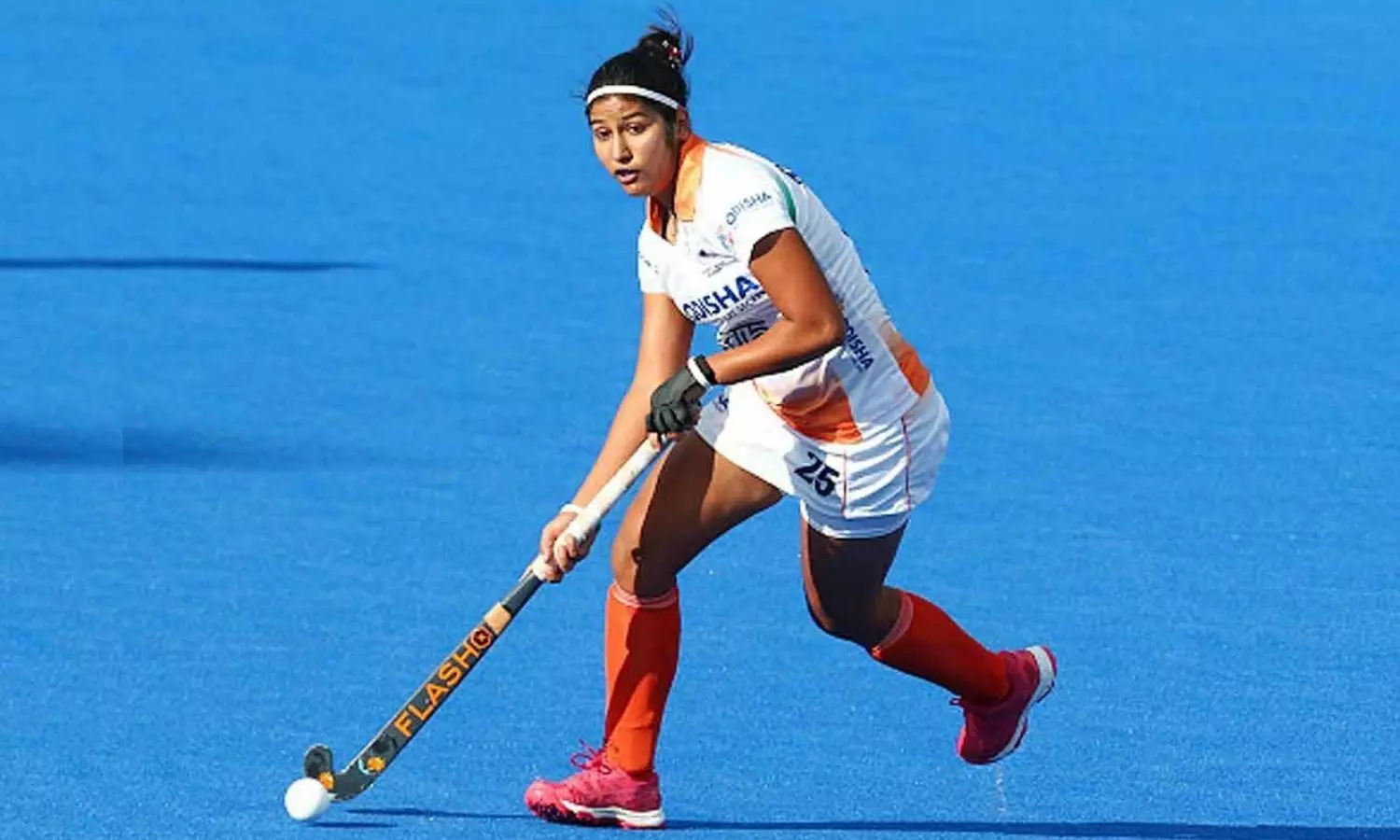
Navneet Kaur
My mother has struggled a lot to help me reach where I am today. Neha also said that the Indian team performed well at the Tokyo Olympics because the team worked hard on its fitness.
After Spain, Indian Men's Hockey Team gears up for German challenge
Indian men's hockey midfielder Hardik Singh and forward Shamsher Singh spoke about the team's preparations for the upcoming FIH Pro League matches against Germany 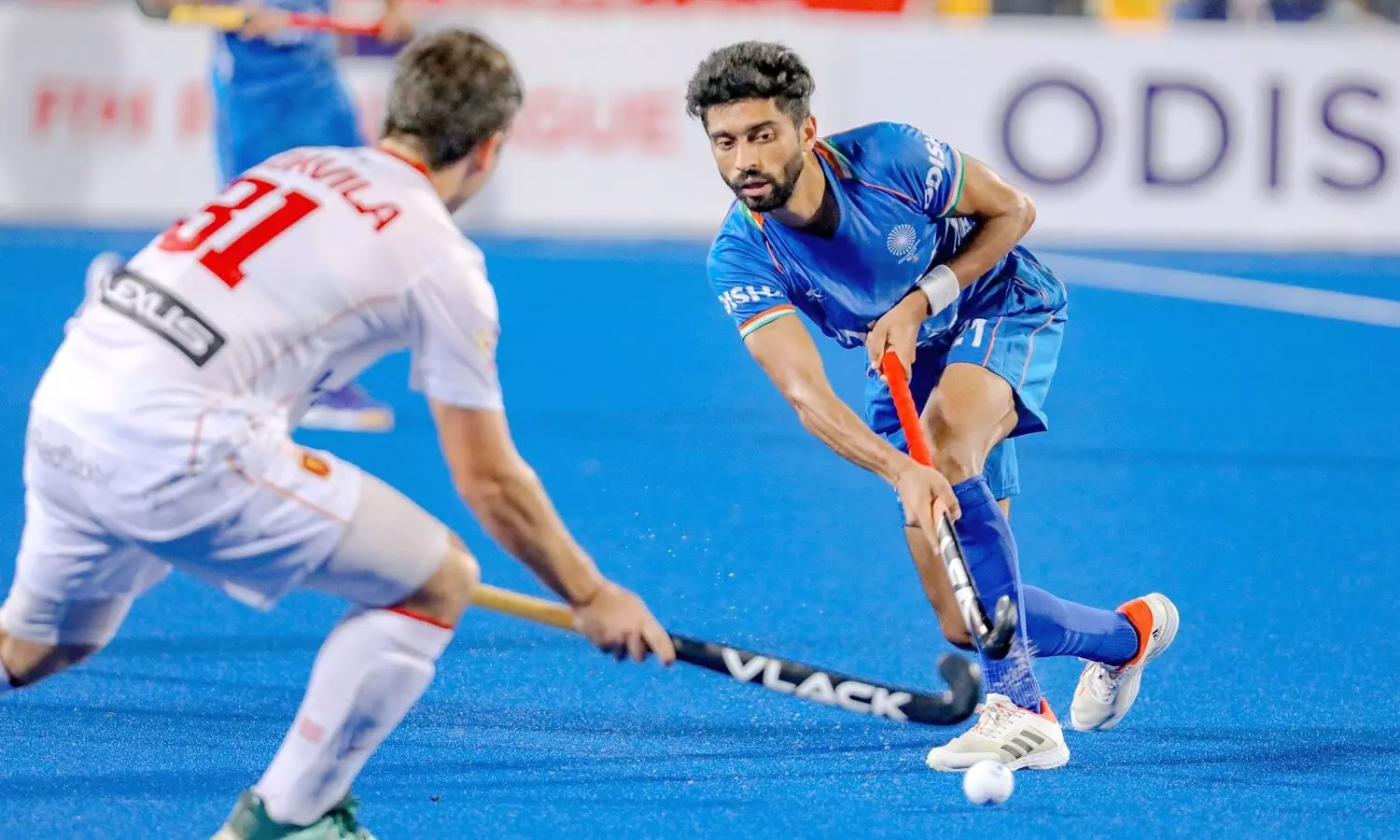
Shamser in action against Spain (Hockey India)
With four wins and two losses in their FIH Hockey Pro League 2021/22 campaign so far, the Indian Men's Hockey Team will look to improve on their execution skills when they take on Germany in the two-legged tie at the iconic Kalinga Hockey Stadium on March 12 and 13.
Need to work on execution and avoid conceding soft goals, say Indian players ahead of Germany tie
India will need to work on their execution skills and do away with the habit of conceding soft goals in order to taste success in a busy calendar year, said Shamsher Singh and Hardik Singh.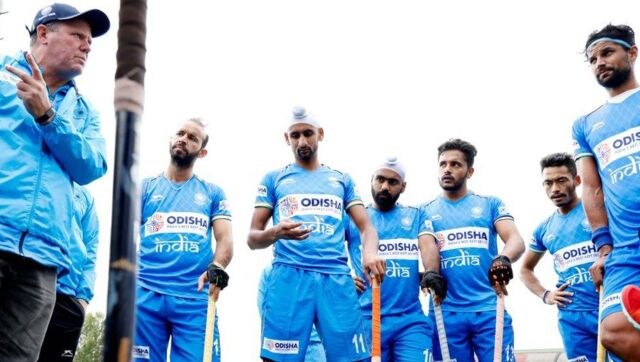
File image of Indian men's hockey team with chief coach Graham Reid. Twitter @HockeyIndia
Bhubaneswar: India will need to work on their execution skills and do away with the habit of conceding soft goals in order to taste success in a busy calendar year, that includes the Commonwealth Games and the Asiad, said Tokyo Olympic bronze medal-winning hockey players Shamsher Singh and Hardik Singh.
How Emma Thomas Has Combined NHS Work and Top Flight Bid
Rod Gilmour 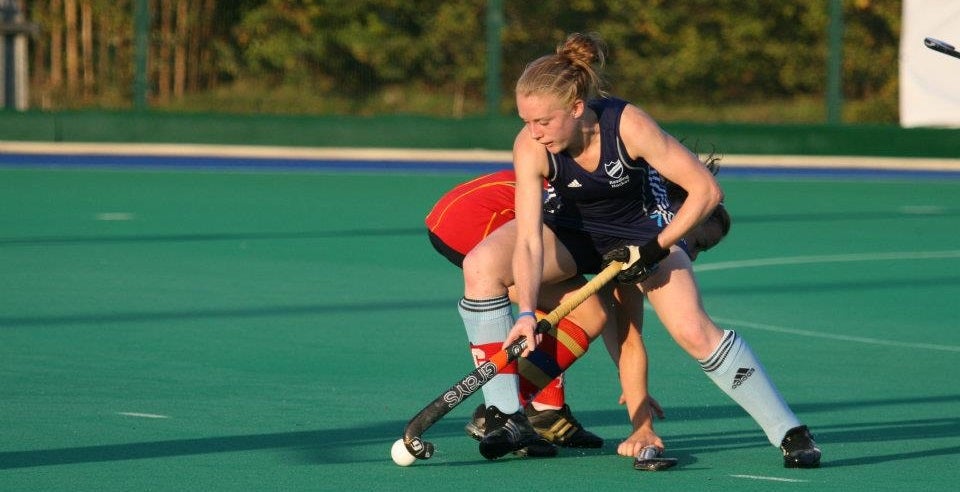
Image by Helen Ritchie Photography
Dr Emma Thomas first played for Reading women as a school sixth former back in 2003/04. “It was a nice shock to the system to discover some players today weren’t even alive when I first started playing," she says. “I remember rocking up with Abi Harper, I don’t recall the game but I remember enjoying it. It is a blurred but positive memory."
Irish EYHL’s big decisions coming into focus on all fronts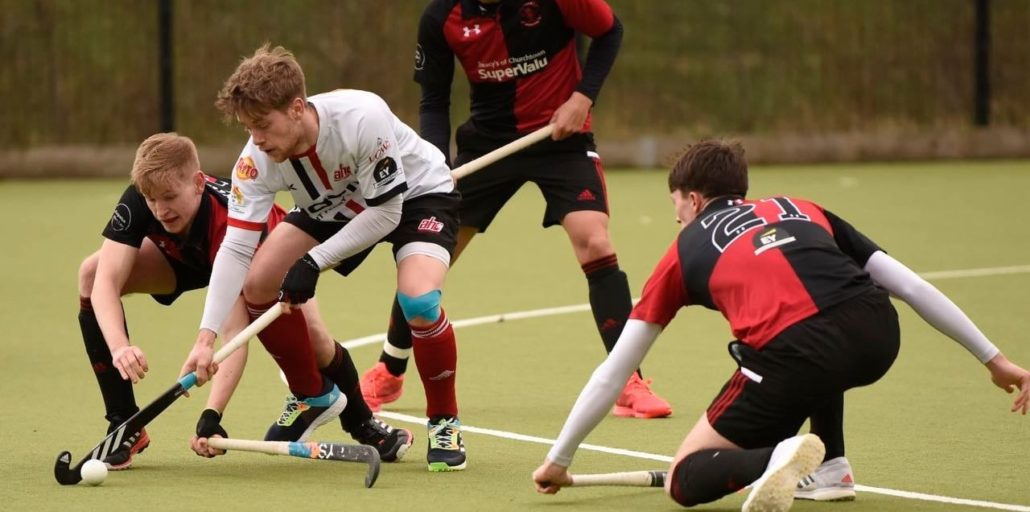
Annadale in action against YMCA last weekend. Pic: Billy Pollock
A bumper 12 EY Hockey League top tier games and four vital EYHL2 fixtures makes for another exciting weekend as the formal prizes come ever closer into view.
Waheed Khan: Centre forward par excellence; manager extraordinaire
By Ijaz Chaudhry
Abdul Waheed Khan
Abdul Waheed Khan, one of the finest centre forwards the game of hockey has seen, breathed his last in Karachi on February 20th at the age of 85. He also achieved tremendous success as the manager of the Pakistan team. Waheed debuted in 1960 against Kenya during the Pakistan team"s preparatory tour of East Africa, en route to the Rome Olympics.
Since, 1947, the Pakistani nation had been waiting for the Olympics gold medal in hockey. The 1960 team was the best prepared and people back home had great expectations. Pakistan won the gold and young Waheed contributed well. With six goals, he was the team"s second top scorer.
The only other title tournament those days was the Asian Games. At the 1962 Asiad, Pakistan defeated India 2-0 in the final. With 17 goals, he topped the scoring chart in the tournament. Till today, it is a record for a single edition of the Asian Games. Scoring a goal in the final was the icing on the cake. Those days, it was a matter of great pride for players from either country to have their name on the score sheet in the Indo-Pak clashes; traditional rivals and the world"s top two sides. It is worth mentioning that Waheed's tally of 17 goals in the 1962 Asiad is also a Pakistan record for a single edition of any of the 'big six tournaments' -- the World Cup, Olympics, Asian Games, Asia Cup, Commonwealth Games and the Champions Trophy.
Next, Pakistan had to defend its gold at the 1964 Olympics. During the final preparatory camp in Abbottabad, Waheed fractured his thumb and was not part of the team at the Tokyo Olympics. Again, Pakistan and India met in the final. Pakistan created several chances but lost 0-1. Centre-forward Tariq Niazi wasn"t impressive in the earlier matches and left in Afzal Manna was mostly played at the centre forward position. Though, a good forward, he couldn"t adjust to the role. People said ‘had Waheed been in the team, Pakistan would have again returned home with the Olympic gold".
Waheed was back for the 1966 Asian Games. India won the final against Pakistan 1-0. Waheed was again Pakistan"s top scorer with eight goals. His total of 25 goals in the two Asian Games is still a Pakistan record.
Soon after, Waheed announced retirement from international hockey. It came as a surprise as connoisseurs believed he could still play at the top for some years. His comment ‘I wanted to retire at my peak’. Waheed scored 52 goals in his career- first Pakistani with a half-century of international goals. He continued to represent his department customs, a very strong team on the domestic scene.
Waheed was a complete centre forward with excellent distribution, superb positioning and proficient scoring. Trendsetter as he used to fall back to help his defence, something not seen those days. And he did it with such efficiency that the attack didn’t suffer. Of slight build but imperious in style, bent on his stick with the ball in front.
A decade later, he returned to serve Pakistan hockey in a new role; manager of the national team. Waheed excelled again. The first assignment was the 1976 Quaid-i-Azam Centenary tournament in Lahore. Pakistan won the event contested by most of the top hockey nations. The national team had no assignment in the year 1977. 1978 began with the long-awaited first Indo-Pak test series with two matches in each country.
Pakistan was victorious 3-1. The series also served as a preparation for the World Cup in the Argentine capital Buenos Aires. Since 1971, Pakistan had failed to win gold at the two Olympics and the two World Cups; unacceptable to the nation those days.
Under Waheed"s tutelage, Pakistan emphatically regained the World Cup. The green shirts became the first team to win the World Cup without losing (or even drawing) a single match. Their goal difference of 31 (35 for and four against) in 1978 is still to date, a World Cup record. The total of 35 goals was also a new highest for a single edition of the World Cup at the time. Later that year, Pakistan won the first Champions trophy in Lahore followed by regaining the Asian Games gold in Bangkok, Thailand. In these two events as well, Pakistan won all its nine matches. That Pakistan maintained such an exceptional level of performance throughout the year speaks volumes about Waheed Khan"s managerial skills. No wonder 1978 is remembered as the annus mirabilis of Pakistan hockey. Waheed decided to leave this role, again for the same reason though the President PHF Air Marshal (retd) Nur Khan wanted him to continue. Waheed said “I have done my job satisfactorily. Good to quit when everyone is happy with you"".
Next year, he wrote the book “Hockey: How to Become World Champions”. The book discussed tactics, strategy and positional play.
After a hiatus of seven years, he was recalled as the manager. In 1985, Waheed guided Pakistan to victory at the second Asia Cup in Dhaka, Bangladesh. In November, at the annual Champions Trophy tournament, Pakistan was fourth but towards the end had started showing the formation of a good combination. In their last match, the green shirts had outclassed the hosts Australia, the winners of that year"s competition. PHF also wanted him to stay as the team had shown signs to develop into a formidable combination for the title tournaments. Since the departure of Air Marshal Nur Khan in 1984, the most successful president of the PHF, the federation"s affairs were being mismanaged and as a result, Pakistan hockey was going disarray. Waheed declined to continue in that scenario. Later events proved it to be a wise decision. 1986 turned out to be a disastrous year for Pakistan hockey. The two-time defending champions were 11th at the World Cup.
Waheed retired from customs with the rank of deputy collector. A sports freak and fitness fanatic, he remained an active tennis player. Mostly played at Karachi"s prestigious modern club where he also became a part of the club"s management team.
His younger brother Abdul Saeed Khan Kashani was also a hockey international. Son Faisal Waheed showed early promise and even toured China with the Pakistan Sports Board"s Under 19 team in 1983. Soon, he left for the USA for the university education, saying goodbye to the family game.
The Pakistan government bestowed Waheed first with the Pride of Performance for his achievements as a player and later with the Tamgha-e-Imtiaz for accomplishments as the manager of the national team.
In 1978, Argentina hosted two World Cups; the hockey World Cup followed by the soccer World Cup. When the Pakistan team landed in Buenos Aires, manager Waheed Khan told the media, “I won"t let any European team destroy the beauty of the game of hockey to win the world title through the penalty corners. His huge statement caught everyone"s attention.
One day, Waheed Khan was informed that the head coach of the Argentine soccer team, Cesar Menotti, had come on his plane to see him.
Much loved chain-smoking Menotti especially wanted to discuss in detail with Waheed, the tactics to break packed defences. He (Waheed) explained to Menotti the 'use of wingers' whenever it becomes difficult to override the opposition through the middle. He also elaborated on the strategy of the ‘double attack’ i.e. if a move from the right side failed then immediately efforts are made to initiate a move from the left on the assumption that most of the opponents' defence had become concentrated on the right side and vice versa.
He also watched a training session of the Pakistan team with Waheed, "I explained to Menotti practically. He noted a few points and then left the ground."
Argentina went on to win the soccer World Cup for the first time. And Menotti sent Waheed a telegram acknowledging that the Pakistan hockey team's ploys came in handy to him.
Ijaz Chaudhry writes on hockey & other sports. For more about him and his work, visit: www.sportscorrespondent.info
Fieldhockey.com
